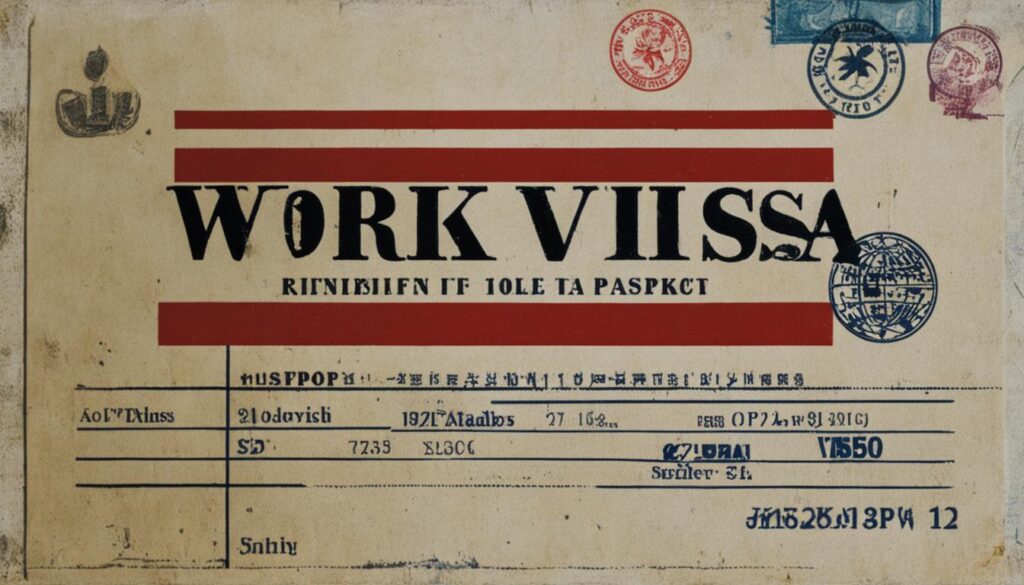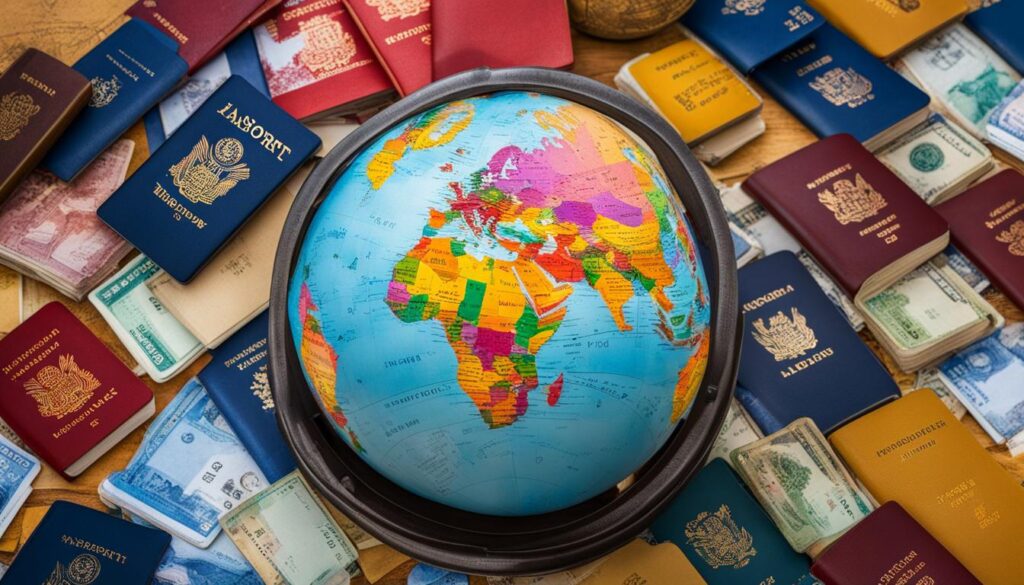If you are considering working abroad, it is essential to understand the legal requirements associated with international employment. Knowing the legalities ensures a smooth transition and helps you stay compliant, avoiding any legal action or penalties. Understanding the legal requirements for working abroad will help you to make informed decisions and prepare for a successful career move overseas.
If you are wondering, “What are the legal requirements for working abroad?” this guide will provide you with an overview of the most essential legal obligations and labor laws you need to be aware of. Some of the most common requirements include work visa regulations, employee rights, labor laws, tax obligations, social security, health and safety standards, and cultural sensitivity.
In the following sections, we will discuss each of these topics in detail to help you navigate the legal requirements of working abroad.
Understanding Work Visa Regulations for Foreign Countries
If you are planning to work abroad, you need to familiarize yourself with the legal requirements and regulations associated with obtaining a work visa for a foreign country. Work visas are temporary permits required by most countries if you want to work or do business there.
The specific work visa regulations and requirements vary depending on the country, industry, and duration of stay. For instance, some countries require a job offer from a local employer, proof of qualifications, and a minimum salary threshold to obtain a work visa. Others may require additional documentation, such as a criminal background check or proof of health insurance.
Before you embark on a job search abroad, research the country’s visa requirements and ensure that you meet all the necessary criteria to obtain a work visa. Failure to comply with work visa regulations could result in you being denied entry to the country or being deported.
It is also essential to note that work visas do not guarantee employment, but rather they permit you to work legally in a foreign country once you have secured a job. Depending on the country, work visas may also allow accompanying family members or spouses to join you, although they may have to apply for separate visas.
Finally, keep in mind that work visa regulations and requirements are subject to change at any time. Therefore, it is advisable to stay up-to-date with any changes in the law and consult with a legal professional or the foreign country’s embassy or consulate in your home country to ensure that you meet all the necessary legal requirements for international employment.
Employee Rights Abroad: Know Your Rights
When working abroad, it is vital to understand your legal position and know the employee rights and protections applicable to your foreign work environment. As an international worker, you have the right to fair wages, a safe and healthy work environment, and protection from discrimination and harassment, among others.
However, the rights and protections available to you may differ from those in your home country. For instance, worker protection laws and regulations may not be as robust in some countries, while others may have strict limits on working hours and breaks. As such, it is crucial to research and understand the specific employee rights and protections relevant to your overseas employment to ensure you are not exploited or taken advantage of by unscrupulous employers.
Another critical aspect of employee rights abroad is the documentation required to maintain these rights. For instance, many countries require foreign workers to provide proof of work authorization and residency permits that must be renewed periodically. Failure to have the necessary documentation may result in legal or employment complications that could have severe consequences.
Ensuring that your work documentation is up to date and in compliance with local regulations is crucial to maintaining your employee rights abroad. Therefore, it is essential to keep track of changes in local laws and regulations that may impact your work permit and residency requirements.
If you are unsure about your employee rights abroad, it may be helpful to seek legal advice from an experienced international employment attorney. Doing so can help you better understand your legal position, the relevant documentation requirements, and other essential aspects of working abroad.
Complying with Labor Laws for Overseas Employment
When working abroad, it’s essential to understand and comply with local labor laws and regulations. Failure to do so can result in complications and legal consequences.
The labor laws for overseas employment may differ significantly from those in your home country. Therefore, it’s crucial to familiarize yourself with the various labor rights and working hours that apply in the foreign country.
In some countries, workers have legal rights to benefits like maternity leave, vacation days, and sick pay. On the other hand, some countries have more relaxed regulations without a minimum wage. Knowing your rights as an employee is crucial to protect yourself from exploitation.
It’s also essential to understand the documentation required for international compliance. You must obtain the necessary work permits and visas, as well as staying up-to-date with legal developments and regulations that may change at any time.
Non-compliance with local labor laws can lead to significant consequences for both employees and employers, such as fines and legal action. By understanding and adhering to overseas labor laws, you ensure a smooth and successful international working experience.
Understanding Tax Obligations for International Workers
As an international worker, it is important to understand your tax obligations to avoid any legal issues and financial penalties. Tax laws vary across countries, which means you may be subject to different rules and regulations than those you are used to. In this section, we will provide insights into the common tax obligations that international workers face and how to fulfill them.
Taxation rules: Taxation rules differ from one country to another. As an international worker, it is your responsibility to understand the local taxation laws to comply with them. You might be required to pay income tax, social security and payroll taxes, and other types of taxes depending on the country. To avoid any confusion, it is advisable to seek guidance from professionals who specialize in tax laws for international workers.
Double taxation agreements: Double taxation occurs when two countries impose taxes on the same income. To avoid this, many countries have entered into double taxation agreements. These agreements help to prevent the double taxation of income and ensure fair tax treatment for international workers. The United States, for example, has entered into double taxation agreements with various countries around the world.
Additional documentation and reporting requirements: Depending on the country you are working in, you may have to file additional tax documentation or report your income to the local tax authorities. Failure to comply with these requirements can lead to severe penalties.
To ensure compliance with tax laws for international workers, it is recommended that you keep detailed records of your income and expenses while working abroad. This will help you when filing tax returns and allow you to take advantage of any available deductions. Consult with a qualified tax professional to ensure you are meeting all your tax obligations and avoiding any legal or financial pitfalls.
Navigating Social Security and Insurance Overseas
When you choose to work overseas, you may have concerns about how your social security and insurance will be affected. It’s essential to be informed before your move overseas to protect and ensure your financial well-being and healthcare needs.
Social security: Your social security benefits could be affected by the country of your work, length of employment, and other factors. It’s crucial to research the social security agreement between the United States and your host country. Some countries may have bilateral social security agreements with the US, allowing you to maintain your social security benefits when working overseas. It’s essential to discuss this further with the US Social Security Administration.
Insurance options: While working overseas, you should have appropriate insurance coverage to protect you and your family from any unforeseen events, including illness or accident. It’s vital to evaluate the insurance offered by your employer and research other insurance options. The additional insurance you may require can be specific to the country and conditions of your host nation and may include health, life, disability, and liability insurance. Experts recommend having insurance coverage that meets or exceeds your state of residence coverage.
| Types of Insurance | Features and Benefits |
|---|---|
| Health Insurance | Provides coverage for medical care, emergency care, and prescription drugs. |
| Life Insurance | Provides death benefit to designated beneficiaries if the policyholder dies while working overseas. |
| Disability Insurance | Provides a benefit if you are injured or become ill and are unable to work. |
| Liability Insurance | Protects you against claims of negligence or damage from third parties. It’s especially useful if you are in a profession like medicine or law. |
By being informed about social security and insurance options when working overseas, you can protect your well-being and ensure your financial stability. Discuss these aspects with your employer or HR representative and research further options available in your host country.
Legal Obligations for International Workers: Health and Safety
Working abroad can be a thrilling experience, but it’s important to remember that your health and safety are paramount. International workers have legal obligations to ensure they work in a safe and secure environment that meets local health and safety regulations.
There are important steps to take before starting your international work assignment:
- Research local health and safety regulations and ensure you understand and comply with them
- Attend any necessary training on local health and safety regulations and workplace hazards
- Closely follow safety protocols, such as wearing appropriate safety gear and following emergency procedures
- Report any safety concerns to your supervisor and take action to mitigate risks in the workplace
Importance of Understanding Local Health and Safety Regulations
Each country has its own set of laws and regulations when it comes to health and safety in the workplace. As an international worker, it is your responsibility to familiarize yourself with these regulations to ensure you are compliant and working safely. Failure to comply with local health and safety regulations can lead to fines, legal issues, and even injury or death in extreme cases.
For example, if you work in the construction industry, there may be specific regulations regarding the use of safety harnesses and other protective gear. Healthcare workers may have specific guidelines for cleanliness and infection control. By understanding the local regulations, you can ensure that your work practices are safe and compliant.
Documentation Required to Comply with Health and Safety Requirements Abroad
International workers may be required to provide specific documentation to prove their compliance with health and safety regulations. This may include things like training certificates, medical clearances, or safety gear certifications. It is important to understand the specific requirements of your host country and ensure that you have all necessary documentation in order.
It’s essential to prioritize your health and safety to enjoy a successful and positive international work experience. Understanding local health and safety regulations, complying with them, and providing any necessary documentation can go a long way in ensuring a safe and compliant workplace.
Cultural Sensitivity and Compliance
Working in a foreign country requires more than just legal compliance; cultural sensitivity is also key to a positive and successful professional experience. Respecting local customs and cultural norms can be as important in creating a productive business relationship as understanding the legalities of international employment.
International workplaces offer a diverse range of cultural influences, and it is important to approach these with an open mind and a willingness to learn. Showing respect for local traditions and adapting to new cultural norms is vital to making a good impression and ensuring a harmonious work environment.
Examples of cultural differences that can impact professional exchanges:
| Cultural Norms | Impact on Business Practices |
|---|---|
| Business card exchange protocol | Failure to exchange business cards correctly can be interpreted as a lack of respect |
| Gift-giving traditions | The incorrect gift or gift-giving procedure can be an insult to the recipient |
| Proper communication style | Bluntness or indirectness can be misinterpreted and result in misunderstandings |
How to show cultural sensitivity and compliance:
- Do your research: Learn about the country’s customs, values, and history to gain an understanding of their cultural mindset.
- Observe and take cues from locals: Pay attention to how your colleagues behave in certain situations and follow their lead.
- Show respect: Always behave in a respectful manner and avoid doing anything that may seem rude or offensive.
- Be flexible: Adapt to new situations and be willing to understand and learn from any mistakes you may make.
By embracing local customs and traditions, you can foster working relationships built on a foundation of mutual respect and understanding. This in turn can lead to a more productive work environment and a successful international career.
Conclusion
Knowing and fulfilling the legal requirements for working abroad is vital for a successful and compliant international career move. As an international worker, you need to be aware of the legal obligations and labor laws associated with international employment to ensure a smooth and compliant transition.
Understanding work visa regulations, fulfilling employee rights, complying with labor laws, fulfilling tax obligations, obtaining social security benefits, ensuring health and safety, and respecting local customs and cultural norms are all essential elements of working abroad.
By adhering to these legal requirements, you can avoid legal complications and enjoy a positive experience while working overseas. Therefore, before embarking on an international career move, take the time to educate yourself about the legal requirements for working abroad. Doing so will make the process go more smoothly for you and your employer, and you can enjoy a rewarding and successful career abroad.
Remember, knowledge is power, and being aware of legalities, permits, and documentation requirements will provide you with a great advantage when working abroad. Bon voyage!

















































